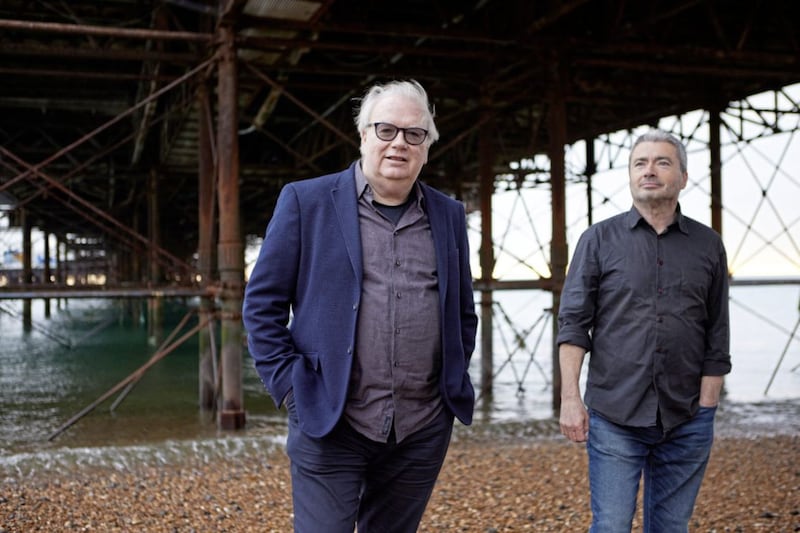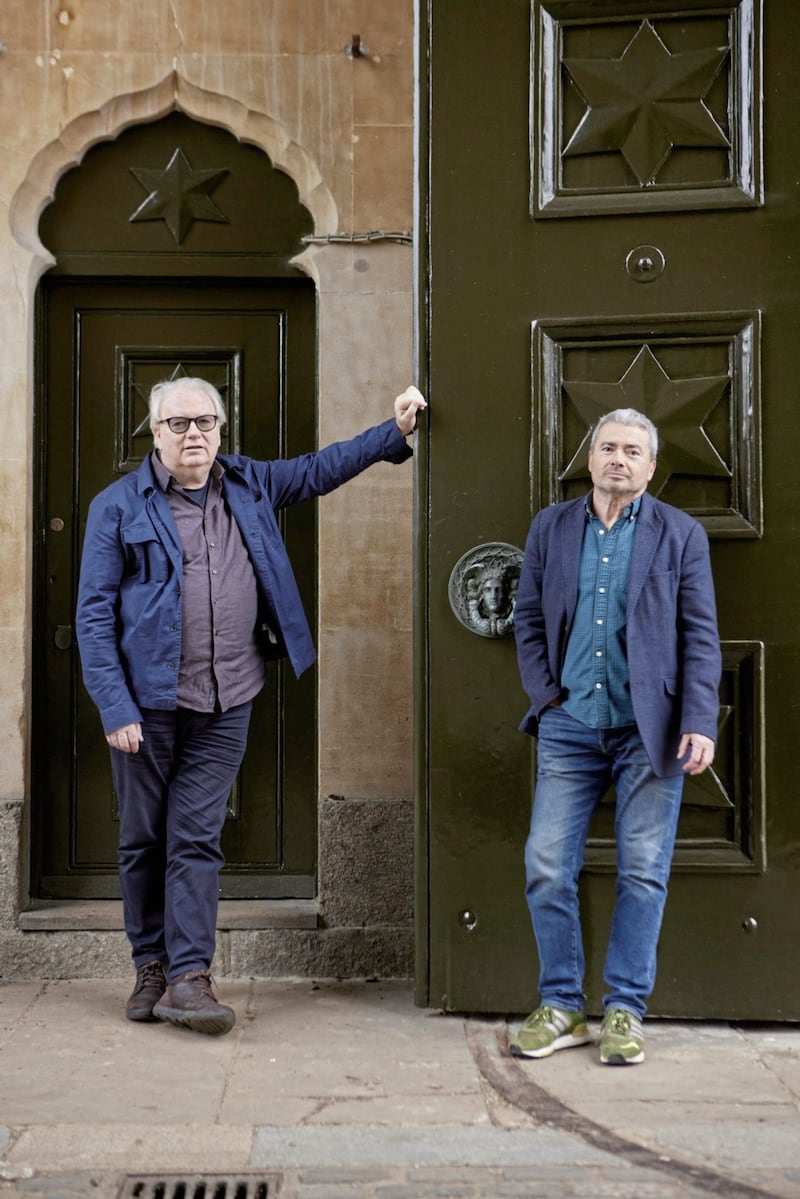THIS year is a big one for Seán Doran and Liam Browne, the dynamic Derry duo with a formidable reputation as arts festival curators extraordinaire.
Known by their creative 'handle' DoranBrowne, 2022 finds the creative pair behind Arts Over Borders marking 10 years of programming eclectic multi-arts 'bio festivals' like the internationally acclaimed Happy Days Enniskillen International Beckett Festival, Lughnasa FrielFest and A Wilde Weekend, drawing inspiration from the lives, works and influences of these Irish literary icons to create memorably unusual events and highlighting a geographically concentrated cauldron of creativity Christened the Northern Literary Lands in the process.
However, this year also finds the duo taking on what is perhaps their most ambitious project to date. They have secured £1.78m funding from the European Commission for Ulysses: A European Odyssey, a £3m project undertaken in association with Dublin's Museum of Literature Ireland to celebrate the centenary of James Joyce's iconic 1922 novel.
It will comprise a series of special events spanning almost two years and involving 18 European cities linked to the author, his novel and its key literary inspiration - Homer's Odyssey.
Famously, Joyce lived on mainland Europe for most of his life, working on his classic Dublin-set novel in Trieste, Zurich and Paris. All three of these cities will be taking part in the centenary celebrations along with Vilnius, Budapest, Marseille, Berlin, San Sebastian, Copenhagen, Istanbul, Cluj, Zurich, Groningen, Eleusis, Oulu, Lisbon, Dublin and Derry.
Ulysses: A European Odyssey will get underway in Athens in September this year before criss-crossing the continent and eventually returning to Ireland with two final events in Dublin and Derry in June 2024.
Creative partners in each city will use themes from a specific episode from Ulysses as an inspirational springboard for producing quirky, bite-sized events in public spaces, along with symposia exploring issues facing contemporary Europe: immigration, national vs European identity, religious/secular co-existence, mental health, climate change and ecological challenges, feminism and educational reform are but some of the topics under consideration.
One writer from each city will also be nominated to contribute work related to their chosen theme to a Great Book of Europe to be published as a literary snapshot of the 100 year anniversary celebrations.
At the moment, Doran and Browne are also currently in the thick of delivering another major arts event they have curated: Fragments is a six-day festival in London celebrating the centenary of TS Eliot's The Waste Land, another 'key text' from 1922.
It finds DoranBrowne commandeering 22 churches across the city in which various artistic responses to Eliot's London-centric poem and its impact on literature are taking place.
Pieces include a 'secular sermon' given by Jeanette Winterson at Southwark Cathedral inspired by the poem's exploration of faith/belief, and a 50-minute rendition of Jesus' Blood Never Failed Me Yet by The Gavin Bryars Ensemble at St Katherine Cree church which chimes with the religious imagery in Eliot's verse.
"It's interesting in terms of these anniversaries and centenaries coinciding," comments Seán Doran.
"What we're doing with the two big 1922 texts all stems from what we started with the Beckett festival back in 2012, that model of a multi-arts eclectic public response to a text, artist or artwork.
"It has been a journey to this point, which feels to us like an arrival point on a bigger stage across Europe."

Joyce penned Ulysses in the wake of the First World War, just as Ireland was being partitioned and with Europe in the grip of a Spanish Flu pandemic. This microscopically detailed day-in-the life account of Leopold Bloom's Dublin odyssey reflects Joyce's view of the modern European city and its public spaces as the stages on which life itself performed.
"We felt that Ulysses is a European work of art," Liam Browne tells me.
"The fact that at the end of the novel he notes the three cities he lived in while writing, Paris, Trieste and Zurich, in a way he's saying that as well: you have Joyce creatively and imaginatively in Dublin, but actually in the years in which he's writing the novel he's living in continental Europe - that's his day-to-day experience.
"Interestingly, when we started to meet potential partners for this [project] across Europe, they also saw Ulysses as a European work of art as well - they didn't see it as just 'an Irish novel', they saw it as part of the culture of Europe.
"That was lovely to hear. Even if they hadn't actually read the novel, they still kind of recognised its place, and that became a great inspiration in terms of how we might work with them."
Doran agrees: "The fact that its protagonist Bloom is a Jew, I think the understanding of that is now pretty certain that it stemmed from his friendship with Italo Svevo who was a Jew in Trieste. And of course he was right in the middle of Europe surrounded by different languages and cultures.
"For us as Irish, it really does give us another way of looking down the telescope upon the book from the authentic European perspective."
A key element of Ulysses: A European Odyssey will be to create events which bring people together in the outdoor public spaces which Joyce took so much inspiration from in his writing, and which have taken on new significance during the Covid-19 pandemic.
"That's a core element of the novel," enthuses Browne.
"So much of the book happens in public spaces. For Joyce, the experience of just walking about a city was a 'civilising' experience: that was how you would develop as a human being, by the people you would meet, what you would see, what you would experience. That was kind of central to him and then he tried to capture that in respect to Dublin with the novel.
"One of the things we've said to all our partner groups is that whatever they do, there must be that relationship with a public space in some way or other."
He adds: "When Seán and I started thinking about this, it was pre-pandemic. Now of course it becomes even more interesting because outdoor public spaces are now regarded as 'safe spaces' if you're going to experience art or something communal.
"We're now all re-appraising our sense of the city, our sense of home - so the project feels very contemporary in that way. Also, when we looked at each of the episodes of the novel to try to find links to contemporary European issues, it was astonishing the extent to which there were. It didn't feel terribly forced, it's all there in the novel."

Naturally, Doran and Browne are delighted to be bringing Ulysses: A European Odyssey to a close in their home city to coincide with the internationally celebrated Bloomsday on June 16, the date on which Ulysses is set - despite Derry no longer being part of the European Union, thanks to Brexit.
Doran chuckles: "We really had to lobby hard to make that happen - and thankfully they [the European Commission] agreed."
He adds: "We've been calling ourselves Arts Over Borders for so many years but it was only when this project was confirmed that we realised that, up until now, we've only really ever gone across one border, from Derry into Donegal. Now, suddenly we're being catapulted across 17 borders.
"One of Joyce's real goals was that his work should be read and accepted by everyone rather than just an elite, so I hope that we will be helping to restore that 'democracy' to Ulysses - as well as its 'Europeaness' - with this project."
:: Keep up to date with Ulysses: A European Odyssey at artsoverborders.com








